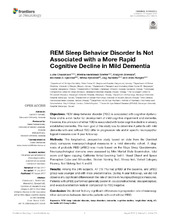| dc.contributor.author | Chwiszczuk, Luiza | en_US |
| dc.contributor.author | Breitve, Monica Haraldseid | en_US |
| dc.contributor.author | Brønnick, Kolbjørn Selvåg | en_US |
| dc.contributor.author | Gjerstad, Michaela D | en_US |
| dc.contributor.author | Hynninen, Kia Minna | en_US |
| dc.contributor.author | Aarsland, Dag | en_US |
| dc.contributor.author | Rongve, Arvid | en_US |
| dc.date.accessioned | 2018-08-14T11:48:50Z | |
| dc.date.available | 2018-08-14T11:48:50Z | |
| dc.date.issued | 2017-08-07 | |
| dc.Published | Chwiszczuk L., Breitve MH, Brønnick KS, Gjerstad MD, Hynninen KM, Aarsland D, Rongve A. REM sleep behavior disorder is not associated with a more rapid cognitive decline in mild dementia. Frontiers in Neurology. 2017;8:375 | eng |
| dc.identifier.issn | 1664-2295 | |
| dc.identifier.uri | https://hdl.handle.net/1956/18076 | |
| dc.description.abstract | Objectives: REM sleep behavior disorder (RBD) is associated with cognitive dysfunctions and is a risk factor for development of mild cognitive impairment and dementia. However, it is unknown whether RBD is associated with faster cognitive decline in already established dementia. The main goal of this study was to determine if patients with mild dementia with and without RBD differ in progression rate and in specific neuropsychological measures over 4-year follow-up. Methods: This longitudinal, prospective study based on data from the DemVest study compares neuropsychological measures in a mild dementia cohort. A diagnosis of probable RBD (pRBD) was made based on the Mayo Sleep Questionnaire. Neuropsychological domains were assessed by Mini Mental State Examination, total score and figure copying, California Verbal Learning Test-II, Visual Object and Space Perception Cube and Silhouettes, Boston Naming Test, Stroop test, Verbal Category Fluency, Trail Making Test A and B. Results: Among the 246 subjects, 47 (19.1%) had pRBD at the baseline, and pRBD group was younger and with male predominance. During 4-year follow-up, we did not observe any significant differences in the rate of decline in neuropsychological measures. Patients with pRBD performed generally poorer in visuoconstructional, visuoperceptual, and executive/attention tests in comparison to RBD negative. Conclusion: We did not find any significant differences in progression rate of neurocognitive outcomes between dementia patients with and without RBD. | en_US |
| dc.language.iso | eng | eng |
| dc.publisher | Frontiers | eng |
| dc.rights | Attribution CC BY | eng |
| dc.rights.uri | http://creativecommons.org/licenses/by/4.0 | eng |
| dc.subject | REM sleep behavior disorder | eng |
| dc.subject | sleep disorders | eng |
| dc.subject | Dementia | eng |
| dc.subject | cognitive decline | eng |
| dc.subject | longitudinal study | eng |
| dc.subject | AD | eng |
| dc.subject | dementia with Lewy bodies | eng |
| dc.title | REM sleep behavior disorder is not associated with a more rapid cognitive decline in mild dementia | en_US |
| dc.type | Peer reviewed | |
| dc.type | Journal article | |
| dc.date.updated | 2018-03-06T12:16:03Z | |
| dc.description.version | publishedVersion | en_US |
| dc.rights.holder | Copyright 2017 The Author(s) | |
| dc.identifier.doi | https://doi.org/10.3389/fneur.2017.00375 | |
| dc.identifier.cristin | 1508723 | |
| dc.source.journal | Frontiers in Neurology | |
| dc.relation.project | Helse Vest RHF: 912018 | |

